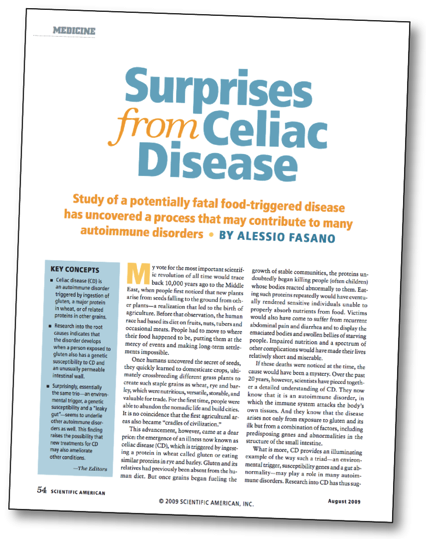The Tale of Two Nightclubs
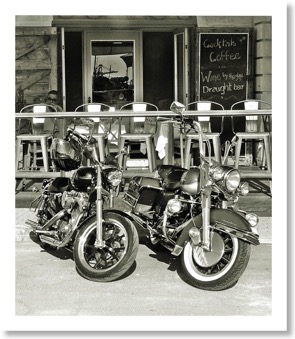
Understanding Celiac Disease Through
Motorcycles and Nightclubs
Several years ago, I encountered a recently-diagnosed guy who was having a rough time. His friends would hassle him about his diet, and he was struggling to explain celiac disease to them. As I got to know him, he revealed he rode motorcycles and hung with his buddies in bars. Back then, I came up with this basic analogy to help them understand. I decided to beef it up a bit. While I geared it toward his interests, I think it's generic enough to be understood by everyone.
Indeed, getting family and friends to understand this condition can be trying at times. It doesn't make sense how we can eat something all of our life - then BANG - we can't. Nor do they comprehend how diligent we must be in our diet or the seriousness of gluten infractions. It's our responsibility to educate them the best we can or as much as they will allow us. Be aware; they may not want to hear any of it.
What is Celiac disease?
The Gluten Intolerance Group defines it this way:
"Celiac disease is a chronic, autoimmune disease which is the result of an immune system response to the ingestion of gluten (a protein found in wheat, rye, and barley) in susceptible individuals. This response to gluten damages the small intestine, leading to malabsorption of nutrients and related health issues."
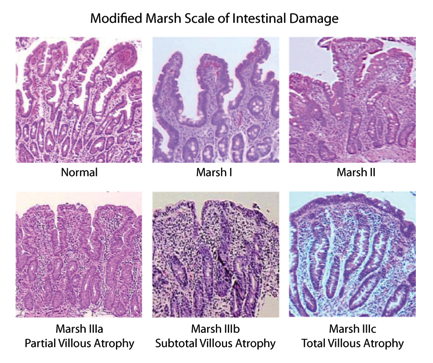
Who can get celiac disease?
"Genetics loads the gun - the environment pulls the trigger. " ~ Dr. Judith Stern, Professor of Nutrition and Internal Medicine University of California at Davis.
How do I get celiac disease?
Often we experience an event that is a suspected trigger like surgery, an infection, illness, pregnancy, or possibly extreme stress. Experts don't completely understand the exact reason a person loses their life-long ability to tolerate gluten, but they're working on it. They know that genetics and environment are necessary, but not sufficient to determine if someone will get celiac disease. Three other elements are vital in this equation: a gut that leaks - allowing the gluten to interact with our immune system; an overly-belligerent immune system; and an altered microbial ecosystem in our gut that is known as our microbiome. Of course, one must be consuming gluten in the first place. In today's society, that's almost a given.
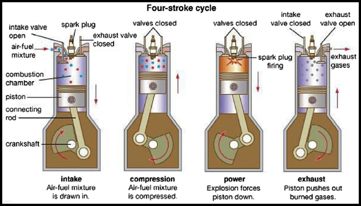
What is gluten?
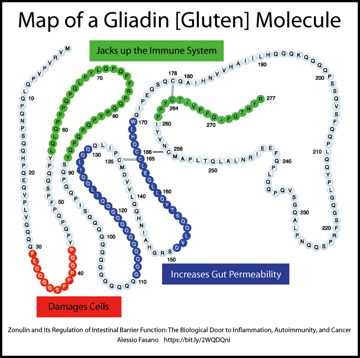
Gluten is the generic term for the proteins found in grains. Wheat [durum, graham, kamut, semolina, spelt, emmer, einkorn), barley [malt], rye [triticale - a hybrid of wheat and rye], and most oats due to cross-contact with gluten are problematic for those with a gluten-related disorder.
I have not heard about celiac disease before, is it new?
Gluten-related disorders such as Celiac Disease, Dermatitis Herpetiformis [an itchy skin manifestation of celiac disease], Gluten Ataxia [unsteady/wobbly walk due to neurologic damage], Wheat Allergy, Gluten/Wheat Sensitivity are not new. Since the introduction of grains during the dawn of agriculture over 10,000 years ago, human-kind experienced problems. During the second century, Aretaeus of Cappadocia, a Greek physician practicing in Rome, observed and documented this condition. In one of his few surviving written works, "The Coeliac Affection," he describes the disease:

"If the stomach be irretentive of food and if it pass through undigested and crude, and nothing ascends into the body, we call such person koiliakos."
If you hadn't guessed, the word celiac [coeliac is the British spelling] comes from the Greek word Koiliakos which means "suffering in the bowels."
The skeletal remains of a young Roman woman buried in a 2,000-year-old tomb in Tuscany showed signs of malnutrition and osteoporosis. DNA analysis revealed she carried two copies of the celiac genes - elevating her risk factor even higher. Experts suspect this woman had untreated celiac disease. What about her diet? Carbon and nitrogen isotope analysis of the bones cannot give us specific details. Still, they suggest she would have consumed more meat, possibly freshwater fish, but limited plants [like wheat].
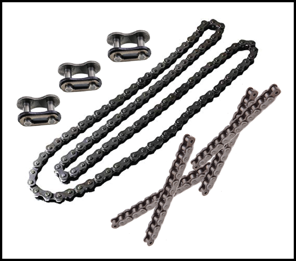
For our body to utilize the food we eat, our digestive system breaks it down into smaller pieces called amino acids. Think of gluten proteins like the drive chain on a motorcycle. Just as the chain consists of individual links, strands of gluten are comprised of amino acids. To break down the strands into digestible amino acids, we need specific enzymes. Those enzymes are like a chain breaker tool. To fully use that chain, we must break it down into individual links.

Engines have gaskets; their purpose is to prevent leakage of oil and water. When gaskets leak, the engine is in trouble. Our gut also has a special gasket; it's called the intestinal epithelial barrier. Unlike gaskets used in engines, our one-cell thick gut gasket is designed to open and close. It opens to allow "friendly" things to pass through like those amino acids. Yet, it also needs to keep out larger items like bacteria, viruses, and fragments of undigested gluten peptides.
Another unusual property of gluten when consumed; it tells our gut gasket to open by stimulating the release of a protein called zonulin. This opening happens in everyone but stays open longer in those with celiac genes due to excess zonulin production. This condition is called increased intestinal permeability, also known as leaky gut. Gluten is not the only thing that can create damage or cause a leaky gut. Just like an engine, when our gut gasket leaks too much, we're in trouble. Gluten sneaks past our epithelial barrier - that’s when the problems start.
What happens when we ingest gluten?
We're going to shift gears (pun intended). Let's compare night clubs or bars and our bodies; today's bar crawl will feature Club 99 and The Crypt. Inside, Club 99's atmosphere is vibrant and inviting. Lots of lush, colorful plants of varied species decorate the room. Tables are neatly aligned and inhabited with diverse and cheerful guests. A beautiful antique bar provides a stunning focal point. Jazz Fusion music plays lightly in the background. Oooo, is that Jean Luc Ponty, I hear? The exterior of the property is well-maintained too. Greeting us at the main door is a chiseled gentleman with broad shoulders, narrow waist, and well-defined biceps bulging out of his stylish Polo shirt emblazoned with a C99 logo. Their security team lurks unobtrusively and quietly in the shadows - waiting and watching. Yes, everything looks quite healthy.
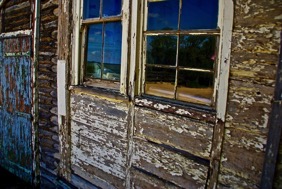

Club 99 illustrates a healthy body inside and out. Our structure is good; we have healthy skin, our intestinal flora and fauna are balanced; everyone works and plays well with others. C99's attentive and well-behaved doorman acts like a "gut gasket" should. He lets good things in and keeps bad things out. C99's security staff is well-trained and evenly tempered - like a healthy immune system. For 99% of the population, their Ninja-like immune system quickly and quietly deals with gluten without incident.
I think you’ll agree, The Crypt is not a good place. Years of damage takes its toll internally and externally. Far too many unsavory characters have taken up residence there, forcing out those who would bring something beneficial to the party. Intensifying an already hostile environment, The Crypt's off duty doorman allows troublemakers inside the club. Conditions are ripe for an epic all-out barroom brawl. “Saturday night's alright for fighting. Get a little action in.” Everything is laid to waste when the overly aggressive security team tears up the place when dealing with the agitators. Shots are fired, broken windows, tables, and chairs become collateral damage during the altercation - our immune system does the same thing when encountering gluten. No organ is safe during these battles royale. With every ingestion of gluten, our bodies take a pounding. It’s no wonder we feel like crap after eating it. Imagine the amount of damage after years or decades of these conflicts. In some cases, our bodies simply can't recover.
Just as bad environments and neglect cause a building to crumble and collapse, the same will happen to our bodies if we do not strictly follow a gluten-free lifestyle. With knowledge, commitment, and attention to our diet, we can renovate The Crypt into a thriving place like Club 99.

Lack of Support From Family-
http://bit.ly/GIGECW_LackofSupport
Educating Family & Friends About Gluten-Free-
http://bit.ly/GIGECW_EducatingFamilyFriends
“Surprises from Celiac Disease” https://bit.ly/2WFmefu![]()
The Tale of Two Nightclubs PDF
Growing Pains of the Gluten-Free Community
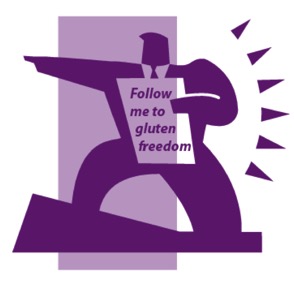
Those of you who have been gluten-free for any length of time, think back to when you first went gluten-free. How many people had even heard about gluten/celiac disease/Non Celiac Gluten Sensitivity/gluten-related disorders? Right, not very many. Fast forward to today, we're seeing gluten-free everywhere. So much in fact that it's being called *gasp* "a fad diet". We, the gluten-free community have been wanting mainstream recognition for a long time. It may not be in the exact form we were hoping for, but GF is now mainstream!
Mintel, a global market research firm predicts retail sales of GF foods and beverages to reach $10.5 billion this year and will grow to $15.6 billion by 2016. They also revealed that 75% of consumers [without CD or NCGS] ate gluten-free foods because they thought the foods were healthier. Some 24% of consumers eat or have someone in their household who eats gluten-free foods. It's very clear this market is not being driven only by those with celiac/gluten-sensitivity.
It's also clear that many people are misinformed and some are probably eating gluten-free for all the “wrong” reasons. Most certainly some confusion is being generated by the “gluten-free dabblers” [those that are experimenting]. Yes, there is a bit of turbulence, but we need to control it best we can and ride it out. The current environment may not be optimal, but I think we are seeing “growing pains” as our society comes to grip with gluten and its effects. Things are in a state of flux right now. The packaged food industry, hospitality industry, food service professionals, health care professionals are all trying to figure out how to deal with the gluten-free phenomenon. We know all too well that some are doing better than others at navigating the uncharted gluten-free waters.
As the researchers keep digging, they keep finding more evidence of harm that gluten is inflicting. Americans have shorter life spans and more illnesses than other comparable high-income countries. It's no secret that on average, we are an unhealthy nation. People are sick and tired of feeling sick and tired so they seek out solutions. Some are willing to take matters into their own hands because many of the medical professionals have some catching up to do when it comes to gluten-related disorders.
Let's take a look at this situation in a different way. I think we can all agree that the path to gluten-freedom is a process. We didn't wake up one morning with this all-encompassing knowledge about gluten-free. It took time for us to build our knowledge base. We all had a starting point; we all took our wobbly first steps.
What if this is a dabbler's first step in their journey? After my biopsies came back negative, I decided to do dietary trials, I went off and on gluten several times over three or four months in order to figure out what was going on. Yup, I was a “GF dabbler”. However, once I figured out gluten was an issue for me, it was hasta la vista, baby! It's been over 10 years since gluten has intentionally touched my lips.
Even though people may be misinformed or have a misunderstanding as to why they are trying gluten-free, they may unexpectedly realize relief from other physical ailments. They might have a “light bulb” moment that could be life-altering for them, their children and future generations of their family.
As frustrating as some of our encounters may be, perhaps being supportive is the best role for us to play. While we may never fully understand or know the true intent of those seeking answers by experimentation, don't they deserve the benefit of the doubt? If I hadn't received support before, during and after my trials, things might have turned out differently. What if we are the only supportive people they encounter while doing this?
Those of us that live this 24/7/365 are the ambassadors of the gluten-free lifestyle. It is our responsibility to educate the masses. If not us – who will? For certain this is a Herculean task, but at least it's easier than herding cats.
There are leaders and those who lead. Leaders typically hold a position of power or authority. Those who lead have the ability to inspire without power or authority. We only need to look to Mahatma Gandhi, Martin Luther King, Jr. and Nelson Mandela as perfect examples of those who lead. We may not possess that amount of fame, but that's the beauty of "those who lead" - we don't need it. Each one of us can inspire others simply by leading by example. We chose not to be a victim; not to give up and say "I can't do this gluten-free thing, it's too hard". We chose to be successful. Every time we opt out from an opportunity to cheat, we show others that we take our health and lifestyle seriously. Indeed our actions can speak louder than words.
Every day we can find gluten free teachable moments, they're all around us. A simple and polite "No thank you, I am gluten-zero because the gluten in those donuts make me sick" when the quickie-mart employee asks if we want 3-for-a-dollar donuts as we pay for gasoline. How about a respectful interchange of facts with those that are "gluten-free most of the time". Better yet, invite them to a local support group meeting, so they can really learn what gluten-free is all about. Sharing educational information with your health care team members [doctor, dentist, pharmacist, etc]. Speaking to food service professionals about gluten-free dining options [or lack there of]. Bringing a plate of your killer peanut butter cookies to [anonymously] share at work; specially for that co-worker who turns up their nose at your "icky gluten-free food". Of course, you don't tell anyone they are gluten-free until Mr/Mrs Food Snob proclaims them as "The Best!". Ah sweet justice.
Gluten-free awareness is continuing to grow, but we need everyone's help. In order to raise awareness properly, everyone in the gluten-free community must keep educating, motivating and advocating.
Keep up the great work everyone!
Alan Klapperich - Branch Manager
GIG of East Central Wisconsin
